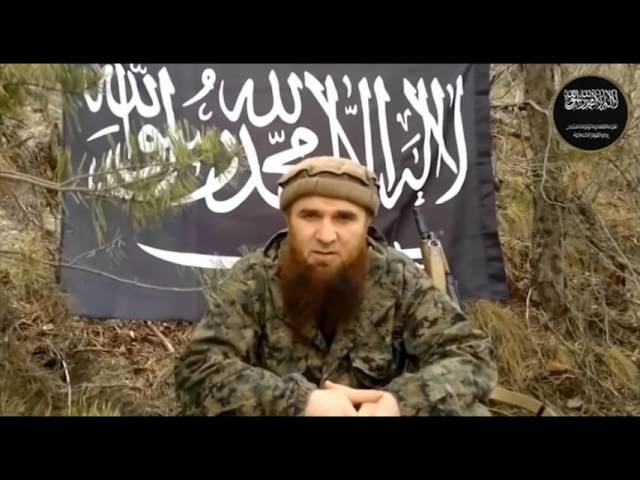
New Caucasus Emirate Leader Takes Hard Line Stance Against Suicide Bombing
Publication: Eurasia Daily Monitor Volume: 11 Issue: 125
By:

Last month, the newly appointed leader of the Caucasus Emirate, Abu Muhammad, explained why Muslims should not support the head of the al-Qaeda breakaway group—the Islamic State of Iraq and the Levant (ISIL), Abu Bakr al-Baghdadi—but instead provide support to al-Qaeda leader Sheikh Ayman al-Zawahiri (Izlesene.com, June 23). The leader of the North Caucasus militants has now put forward a new set of initiatives.
Abu Muhammad’s latest statement, which was made in a video posted online on July 2, concerns the strategy and tactics of the North Caucasus insurgency. It deserves serious attention, because it defines the actions the region’s militants will take in the near future. In the newly released video, the emir of the Caucasus Emirate responded to questions asked by members of the insurgency (Izlesene.com, July 02).
One of the first questions concerned suicide bombers and whether it is justified and necessary to continue using them. Emir Abu Muhammad unequivocally spoke against suicide bombers. He said that there was no point in losing a militant only for the sake of carrying out a bomb attack somewhere in Russia. The insurgent leader also spoke against female suicide bombing even more strongly, saying it is only justified when the police corner a woman and she thinks she will be persecuted if she surrenders. Abu Muhammad expressly prohibited female suicide bombers under all other circumstances, saying that he had previously prohibited many women from carrying out such attacks. The Caucasus Emirate leader then cited the example of Afghanistan, where he said there has not been a single case of “istishad”—suicide bombing by a female (Kavkaz-uzel.ru, July 01). Abu Muhammad pointed out that this method of fighting was imported from elsewhere and was neither necessary nor obligatory in the North Caucasus.
The rebel leader said that the death of a female in a house surrounded by the police is of no use to the militants and asked what could be the purpose of the death of a young female, if she has the opportunity to surrender and hope that one day she will be exchanged or continue jihad after her release. As an example, Abu Muhammad cited the case of Ruzana Ibragimova, who was killed on April 24 in a special operation in Khasavyurt, Dagestan, while she was in her ninth month of pregnancy. Ibragimova refused to leave a house that was surrounded by police and decided to die along with her husband (Kavkaz-uzel.ru, April 25). The rebel leader reprimanded the dead woman for having taken this decision, saying that she had no right to make such decisions for her unborn child.
Abu Muhammad also said that most of the time civilians die in suicide attacks in Russia and that he, as the emir of the Caucasus Emirate, did not support attacks against civilians. At the same time, he noted that suicide bomb attacks would continue in Russia, but only against those who harm the militants. The insurgent leader said he would do everything possible to avoid civilian victims. Moreover, he offered apologies to the civilian population of Russia for all of the victims of suicide attacks (Rusplt.ru, July 02). In 2012, the then Caucasus Emirate leader Doku Umarov also suspended any terror attacks that would harm Russian civilians (Radio Liberty, February 03, 2012). However, he broke the conditions of that truce a year later and called on the militants to carry out strikes across Russia, using all available means (3mv.ru, July 03, 2013).
Abu Muhammad also touched on relations with Sufism. According to the rebel leader, the Sufis are not the enemies of the insurgents and did not want to have a conflict with the militants. However, he said that the Sufis decided to go to war with the Salafist insurgency after the official spiritual bodies, which are dominated by Sufis, declared war on Salafist militants. Therefore, the militants would continue attacks on people who harm the insurgents and cooperate with the authorities, Abu Muhammad said. This is not the first time that followers of the Caucasus Emirate have raised this issue. Two years ago, Umarov was also forced to say the rebels were not fighting the Sufis and did not consider them enemies per se. Rather, he said, the rebels thought of the Sufis as brothers and asked them not to remain neutral, but to support the insurgency (Youtube.com, September 13, 2012).
Doku Umarov realized that it was impossible to hurl insults at the Sufis and at the same time elicit support from residents of Chechnya. So, it was decided not to vilify ordinary murids (followers of a Sufi sheikh), but only those who cooperated with the authorities. Thereby, the Caucasus Emirate separated ordinary Sufi parishioners from the official Muslim clergy, who are essentially propagandists on the government payroll.
Another question concerned whether Muslims in Russia should consider moving to Muslim countries because the Russian authorities do not allow Muslims to observe their religion. Abu Muhammad responded by saying that there was no country in the world that would fully satisfy the criteria of a true Islamic country, with Sharia installed properly. Therefore, he said, no one should leave his or her country.
Out of all statements made by Abu Muhammad in the latest video, the most important was the one about suicide bombings. The new emir has not simply suspended the practice of suicide bombings as Doku Umarov did previously, but argues that the very practice of suicide bombings is useless and alien to the culture of the North Caucasus. Such statements have not been made since the Caucasus Emirate was founded in 2007. Instead of a moratorium, he is attempting to resolve this issue once and for all by removing it from the agenda entirely.
It is another matter whether all the insurgents will accept these statements unquestioningly. Unquestionable acceptance is unlikely given that some will say that the emir is wrong and the use of suicide bombings should not be restricted. Officially, however, all national jamaats will adhere to Emir Abu Muhammad’s pronouncements, in order to counter those who have doubts about the extent of the emir’s authority. In the near future, the national jamaats of the North Caucasus are likely to display new types of behavior in line with these pronouncements by the new Caucasus Emirate emir, who is predisposed to radical policy changes.




